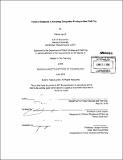Political obstacles to adopting congestion pricing in New York City
Author(s)
Lynch, Patrick (Patrick Michael)
DownloadFull printable version (3.020Mb)
Other Contributors
Massachusetts Institute of Technology. Dept. of Urban Studies and Planning.
Advisor
Judith Layzer.
Terms of use
Metadata
Show full item recordAbstract
In April 2007, New York City's Mayor Bloomberg released PlaNYC, a broad ranging set of planning initiatives for the city. A centerpiece of the plan was a congestion-pricing proposal for the downtown core in Manhattan. The proposal had the backing of key political figures, federal funding, and broad popular support, yet in failed to clear the state assembly without even getting a vote. The failure of Bloomberg's proposal is instructive not only to New York and other cities considering congestion pricing, but also to proponents of a broad range of sustainability initiatives. This thesis argues that specific aspects of the mayor's proposal created easily identifiable opponents unified on geographic lines, specifically in the outer boroughs of New York City. Further, the planning process failed to appease enough of these opponents or build a winning coalition to enact the policy. New York City is a challenging institutional environment, and in this setting, coalition building becomes even more important.
Description
Thesis (M.C.P.)--Massachusetts Institute of Technology, Dept. of Urban Studies and Planning, 2010. Cataloged from PDF version of thesis. Includes bibliographical references (p. 48-51).
Date issued
2010Department
Massachusetts Institute of Technology. Department of Urban Studies and PlanningPublisher
Massachusetts Institute of Technology
Keywords
Urban Studies and Planning.